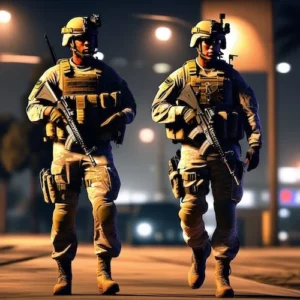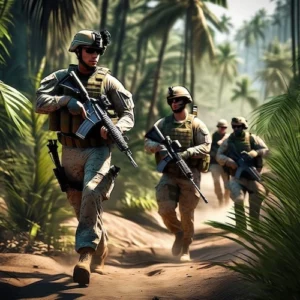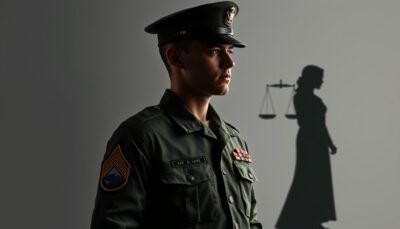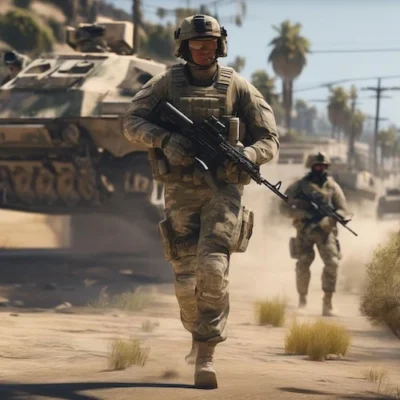Who is the Best Fort Jackson Court Martial Lawyer?
Stationed at Fort Jackson, South Carolina? Facing a court-martial, UCMJ action, Administrative Separation Board, or other Adverse Administrative Action? Call our experienced Fort Jackson military defense lawyers at 1-800-921-8607 for a free consultation.
“Your career, reputation, and even your freedom hang in the balance. A single misstep could derail everything you’ve worked for. This isn’t just a legal matter; it’s a fight for your future.” (Michael Waddington, Military Defense Lawyer).
Find the Best Fort Jackson Court Martial Lawyers for Your Case
Who is the Best Fort Jackson court martial lawyer? Soldiers facing UCMJ action or court-martial trials often ask this question. However, there is no such thing as the “Best Fort Jackson court martial lawyer.” Soldiers should ask, “How do I find the best military lawyer for my case.”
Finding the best court martial for your case requires you to do some homework because finding the best court martial lawyer is crucial for any service member facing court-martial or other military legal issues at Fort Jackson, South Carolina. While it might be tempting to seek out a single “best” lawyer, the truth is that the ideal court martial lawyer varies based on individual needs and specific circumstances.
Is there such a thing as the Best Fort Jackson court martial lawyer?
“No, there is no one best Fort Jackson court martial lawyer. The best court martial lawyer should be experienced, ethical, skilled, hard-working, yet not overworked, and creative. This article will explore the qualities that define a top court martial lawyer, what court martial lawyers do, the role of JAG lawyers, and the differences between JAG and civilian court martial lawyers.”
Finding the Best court martial lawyer
Choosing the best court martial lawyer is crucial for any service member facing legal issues, but the ideal lawyer varies based on individual needs and specific circumstances.
Defining the Best Court Martial Lawyer
The best court martial lawyer should be experienced, ethical, skilled, hard-working, yet not overworked, and creative. This article will explore these qualities, the roles of court martial lawyers, the Judge Advocate General’s (JAG) Corps lawyers, and the differences between JAG and civilian court martial lawyers.
Roles of a Fort Jackson Court Martial Lawyer
Civilian court martial lawyers represent service members in various legal matters, including court-martials, administrative separation hearings, and non-judicial punishment proceedings. Their primary role is to defend the rights of the accused, ensuring they receive a fair trial and the best possible outcome. These lawyers are skilled in military law, which significantly differs from civilian law, and they must navigate the complexities of the Uniform Code of Military Justice (UCMJ). Manual for Courts-Martial, United States (2024 ed.)
Understanding JAG Lawyers
 Judge Advocate General’s (JAG) Corps lawyers are commissioned officers serving as military legal advisors. They counsel commanders and service members, prosecute and defend cases in military courts, and handle various legal matters, including operational law, international law, and military justice. JAG lawyers are integral to maintaining the legal and ethical standards of the armed forces.
Judge Advocate General’s (JAG) Corps lawyers are commissioned officers serving as military legal advisors. They counsel commanders and service members, prosecute and defend cases in military courts, and handle various legal matters, including operational law, international law, and military justice. JAG lawyers are integral to maintaining the legal and ethical standards of the armed forces.
Differences Between JAG and Civilian Court Martial Lawyers
JAG and civilian court martial lawyers can represent service members, but there are distinct differences. JAG lawyers are active-duty military personnel assigned to cases based on their service branch’s needs, providing free legal representation to service members. However, they may face constraints due to their military duties and potential conflicts of interest.
Civilian court-martial lawyers, on the other hand, operate independently of the military and are hired directly by the service member. They offer more personalized attention and are not limited by military assignments or duties. However, hiring a civilian court martial lawyer requires payment for their services, which can be costly.
Qualities of the Best Court Martial Lawyers
- Experience: A lawyer with extensive experience in military law and court-martial cases is essential. They understand the intricacies of military justice and can navigate complex legal issues effectively. The best court martial lawyers often have 20 or more years of experience in military law and criminal defense.
- Nationally Known: The best court martial lawyers often hold national recognition and actively participate in national criminal defense organizations and Continuing Legal Education (CLE) events. Membership in organizations like the National Association of Criminal Defense Lawyers (NACDL) signifies a commitment to the highest standards of legal practice.
- Ethical Standards: The best court martial lawyer adheres to high ethical standards, ensuring honesty, integrity, and fairness. Ethical conduct builds trust and credibility.
- Skill in Legal Advocacy: Effective legal advocacy requires strong communication and persuasion skills. A skilled lawyer can present compelling arguments and vigorously defend their client’s rights.
- Published Author: The best Fort Jackson court martial lawyers often publish books and articles on legal subjects, demonstrating a deep understanding and mastery of their field.
- Hard-Working: A diligent Fort Jackson court martial lawyer will dedicate time and effort to build a strong defense. Hard work involves thorough preparation, research, and attention to detail.
- Teamwork: Hiring a small elite team led by an experienced Fort Jackson court martial lawyer can significantly impact the outcome of your case. This ensures personalized and dedicated representation, with direct attention from the lead counsel.
- Not Overworked: The best court martial lawyer manages their caseload to avoid being overworked. This ensures they can provide focused and individualized attention to each client.
- Creativity: Creative problem-solving and innovative legal strategies can significantly impact complex cases. A creative lawyer can find unique solutions to challenging legal issues.
- Knowledge of Military Law: A deep understanding of the UCMJ and military regulations is essential. The best court martial lawyer stays updated on legal developments and case law.
- Strong Negotiation Skills: Negotiation is a critical aspect of legal defense. A lawyer with strong negotiation skills can secure favorable plea deals or settlements.
- Compassion: Empathy and compassion towards clients can provide much-needed emotional support during stressful times.
- Attention to Detail: Meticulous attention to detail ensures that no aspect of the case is overlooked.
- Trial Experience: Courtroom experience is invaluable. A lawyer who has successfully tried cases can navigate court proceedings confidently and effectively.
- Strong Research Skills: Legal research is foundational to building a solid defense. A lawyer with strong research skills can uncover critical information and precedents.
- Accessibility: Being accessible and responsive to clients’ needs is crucial. The best court martial lawyer maintains open communication and is available for consultations.
- Clear Communication: Clear and concise communication helps clients understand their legal options and the potential outcomes.
- Strategic Thinking: Strategic planning and foresight are key to anticipating challenges and preparing for various scenarios in a case.
- Professional Reputation: A lawyer’s reputation within the legal community can influence case outcomes. The best court martial lawyer is respected by peers, judges, and prosecutors.
- Dedication to Client’s Best Interest: A dedicated lawyer prioritizes the client’s best interests above all else, advocating fiercely for their rights and desired outcomes.
- Multidisciplinary Knowledge: Understanding related fields such as forensic science, psychology, and technology can enhance a lawyer’s ability to build a robust defense.
- Tenacity: Persistence and determination are essential traits. The best court martial lawyer does not give up easily and fights tirelessly for their clients.
- Client Education: The best court martial lawyer educates clients about their rights, legal processes, and potential outcomes, empowering them to make informed decisions.
Hiring a Fort Jackson court martial lawyer
“While there is no best Fort Jackson court martial lawyer, the above qualities can help you identify the right lawyer for your needs. The best Fort Jackson court martial lawyer for your case will possess a combination of experience, ethical standards, legal skills, and dedication to client service. Whether you choose a JAG lawyer or a civilian court martial lawyer, ensuring they embody these qualities will give you the best chance of a successful defense.”
Examples of Fictitious Cases a Fort Jackson court martial lawyer Could Handle and Potential Defenses:
Case 1: Article 120 – Sexual Assault at Fort Jackson, SC
Case Details:
PFC Jessica Brown was accused of sexual assault after an off-base party. She allegedly forced herself on another soldier while they were intoxicated and unable to consent. The accusation arose after the alleged victim reported the incident to their commanding officer.
Fort Jackson court martial lawyer Strategies:
Fort Jackson court martial lawyers could thoroughly investigate the events of the night in question. They would interview witnesses, collect any video or photographic evidence, and analyze the behavior of both parties involved. The defense could challenge the reliability of the accuser’s memory due to intoxication and present evidence suggesting mutual consent.
Case 2: Article 120c – Indecent Viewing at Fort Jackson, SC
Case Details:
SFC John Miller was accused of indecent viewing after allegedly using a hidden camera to record fellow soldiers in the barracks shower area without their consent. One of the soldiers discovered the camera, leading to an investigation.
Fort Jackson court martial lawyer Strategies:
Fort Jackson court martial lawyers could question the legitimacy of the evidence obtained, ensuring proper procedures were followed during the investigation. They might also argue that there was no intent to record or view individuals without consent. The defense could call character witnesses to testify about Miller’s integrity and present evidence that someone else might have placed the camera.
Case 3: Article 120b – Rape and Sexual Assault of a Child at Fort Jackson, SC
Case Details:
MSG Rick Thompson was charged with the sexual assault of a minor, allegedly engaging in inappropriate conduct with a family friend’s child during a visit. The charges came to light after the child confided in a school counselor.
Fort Jackson court martial lawyer Strategies:
Fort Jackson court martial lawyers would meticulously review the child’s statements for inconsistencies and seek to understand the context of the accusations. They could gather forensic evidence and expert testimony to refute the charges. Additionally, they might present evidence showing Thompson had no opportunity or intent to commit the alleged acts, aiming to create reasonable doubt.
Case 4: Article 128 – Assault at Fort Jackson, SC
Case Details:
PVT David Lee was accused of assaulting another soldier during a heated argument in the barracks, resulting in significant injuries. The incident was reported by a third party who witnessed the altercation.
Fort Jackson court martial lawyer Strategies:
Fort Jackson court martial lawyers could argue that Lee acted in self-defense. They would gather evidence of prior threats or aggressive behavior from the alleged victim and present witness testimonies supporting Lee’s claim. The defense might also highlight inconsistencies in the victim’s statements and the physical evidence.
Case 5: Article 112a – Drug Use at Fort Jackson, SC
Case Details:
CPT Rachel Carter was charged with using illegal substances after testing positive for drugs during a random urinalysis test. The positive result led to an immediate investigation into her conduct.
Fort Jackson court martial lawyer Strategies:
Fort Jackson court martial lawyers could challenge the accuracy and handling of the drug test, arguing potential contamination or procedural errors. They could also present evidence of Carter’s exemplary service record and argue that the positive test could be due to a legitimate medical condition or prescription.
Case 6: Article 121 – Larceny at Fort Jackson, SC
Case Details:
SSG Michael Harris was accused of stealing government property, specifically high-value equipment, from the base supply room. The items were found missing during a routine inventory check.
Fort Jackson court martial lawyer Strategies:
Fort Jackson court martial lawyers could argue that Harris had authorization to access the equipment or was mistakenly identified. They might gather evidence to show a lack of intent to permanently deprive the government of its property, such as documentation proving Harris intended to return the items or that they were misplaced.
Case 7: Article 134 – Child Pornography at Fort Jackson, SC
Case Details:
SPC Johnny Adams was charged with possessing and distributing child pornography found on her personal computer during an unrelated investigation into internet usage.
Fort Jackson court martial lawyer Strategies:
Fort Jackson court martial lawyers could argue that Adams was unaware of the content on her computer and that others had access to it. They might challenge the legality of the search and seizure of her computer, aiming to suppress the evidence obtained. The defense could also seek expert testimony to show that the files could have been downloaded without Adams’s knowledge.
Case 8: Article 93a – Prohibited Activities With Recruits at Fort Jackson, SC
Case Details:
SFC Robert Thompson was accused of engaging in an inappropriate relationship with a recruit under his supervision. Allegedly, Thompson sent flirtatious text messages and met the recruit off-base, which led to an investigation after the recruit reported feeling uncomfortable.
Fort Jackson court martial lawyer Strategies:
Fort Jackson court martial lawyers could argue that the relationship was misinterpreted and that Thompson’s actions were intended to mentor, not exploit. They might gather evidence of Thompson’s exemplary service record and character witnesses to testify to his integrity. The defense could also highlight the lack of physical evidence and question the recruit’s credibility.
Repercussions and Career Impact:
If found guilty, Thompson could face a court-martial resulting in a reduction in rank, forfeiture of pay, confinement, and a possible dishonorable discharge. This would severely damage his military career and future employment opportunities.
Case 9: Article 93a – Prohibited Activities With Recruits at Fort Jackson, SC
Case Details:
SGT Olivia Perez was accused of offering special privileges to a recruit in exchange for personal favors. The recruit reported the incident to a superior after feeling pressured to comply.
Fort Jackson court martial lawyer Strategies:
Fort Jackson court martial lawyers could challenge the credibility of the recruit’s claims by presenting evidence of no quid pro quo and demonstrating that any privileges given were based on merit. They might also gather testimonies from other recruits to show Perez’s fair and impartial treatment of all recruits under her supervision.
Repercussions and Career Impact:
If found guilty, Perez could face non-judicial punishment, including reduction in rank, forfeiture of pay, and extra duty. Her career would be significantly impacted, with reduced chances for promotion and possible reassignment to a less desirable position.
Case 10: Article 93a – Prohibited Activities With Recruits at Fort Jackson, SC
Case Details:
SSG David Lee was accused of inappropriate advances towards a recruit during training sessions. The recruit claimed that Lee repeatedly made suggestive comments and created a hostile training environment.
Fort Jackson court martial lawyer Strategies:
Fort Jackson court martial lawyers could argue that the comments were taken out of context or misinterpreted. They might present evidence of Lee’s professional conduct history and gather statements from other recruits and instructors who did not witness inappropriate behavior. The defense could also question the recruit’s motives for making the allegations.
Repercussions and Career Impact:
If found guilty, Lee could face a court-martial, resulting in a reduction in rank, confinement, and a possible dishonorable discharge. This would severely damage his military career and reputation, challenging his future employment.
In each of these cases, Fort Jackson court martial lawyers would play a crucial role in protecting the rights of the accused soldiers. They would meticulously examine the evidence, challenge procedural errors, and present strong defenses to mitigate charges or seek acquittals. By leveraging their expertise and experience, Fort Jackson court martial lawyers can significantly impact the outcome of these serious cases, ensuring fair trials and just results for their clients.
Fort Jackson: The Heartbeat of Army Training in South Carolina
Fort Jackson, located in Columbia, South Carolina, is the largest and most active Initial Entry Training Center in the United States Army. It has been a cornerstone of Army training since its establishment in 1917. It prepares soldiers for service through rigorous training programs to build their skills, resilience, and commitment to the nation.
Fort Jackson, A Historic Beginning
Fort Jackson was named after Andrew Jackson, the seventh President of the United States and a South Carolina native. The installation was created as the United States prepared to enter World War I and played a crucial role in training soldiers for combat. Over the years, it has evolved to meet the changing needs of the Army, reflecting advancements in military tactics, technology, and training methodologies.
Training at Fort Jackson
Fort Jackson’s primary mission is to provide basic combat training to new Army recruits. The installation trains over 50,000 basic and advanced individual training soldiers each year. The comprehensive training covers physical fitness, weapons handling, tactical maneuvers, and survival skills. The goal is to transform civilians into soldiers ready to serve their country with discipline and proficiency.
The installation is equipped with state-of-the-art facilities to support this mission. This includes firing ranges, obstacle courses, and simulation centers that provide realistic training scenarios. In addition to basic training, Fort Jackson also hosts several specialized schools, including the United States Army Chaplain Center and School and the Drill Sergeant Academy, which trains the next generation of Army instructors.
Fort Jackson Community and Family Support
Fort Jackson is not just a training center but a community that supports soldiers and their families. The installation offers a range of services and amenities to ensure the well-being of its residents. These include healthcare facilities, schools, recreational centers, and family support programs. The Army Community Service (ACS) program at Fort Jackson provides various resources to help families adjust to military life, from financial counseling to deployment support.
Fort Jackson has a strong relationship with the local Columbia community. The installation’s presence significantly impacts the region, providing jobs and contributing to local businesses. Community events, such as military appreciation days and open houses, foster a sense of connection and mutual support.
Fort Jackson Modernization and Future Plans
As the Army’s needs evolved, so did Fort Jackson. The installation is continuously modernizing its facilities and training programs to prepare soldiers for the challenges of modern warfare. This includes incorporating advanced technologies into its curriculum, such as virtual reality simulations and cyber training modules.
One of the key initiatives at Fort Jackson is the Army’s Holistic Health and Fitness (H2F) program, which focuses on improving soldiers’ physical, mental, and emotional well-being. This comprehensive approach to fitness aims to enhance performance, reduce injuries, and promote overall health, ensuring that soldiers are ready to meet the demands of their service.
Visiting Fort Jackson
Fort Jackson is accessible to the public, and visitors can learn more about its history and mission at the Fort Jackson Museum. The museum showcases artifacts, photographs, and exhibits highlighting the installation’s role in training soldiers over the decades. Special events and ceremonies, such as graduations, are also open to the public, offering a glimpse into a soldier’s life.
Hiring the Best Fort Jackson court martial lawyer
Fort Jackson stands as a testament to the enduring spirit and resilience of the United States Army. It has played a vital role in shaping the Army’s capabilities and will continue to do so. Whether you are a soldier, a family member, or a visitor, Fort Jackson represents the dedication, strength, and community that are the hallmarks of military service.
This blog post provides a comprehensive overview of Fort Jackson, highlighting its history, training programs, community support, and future initiatives.




